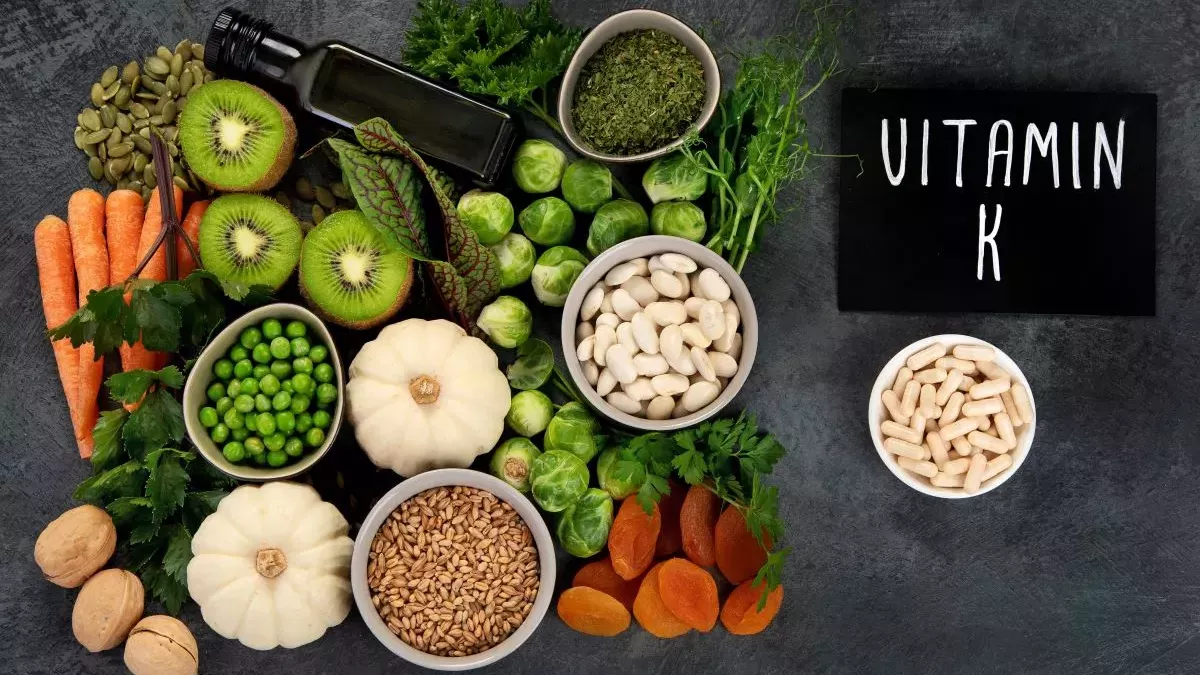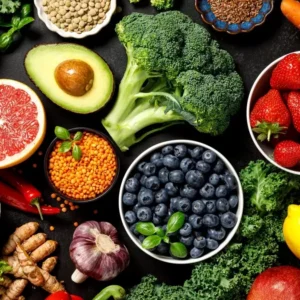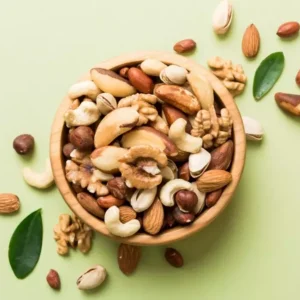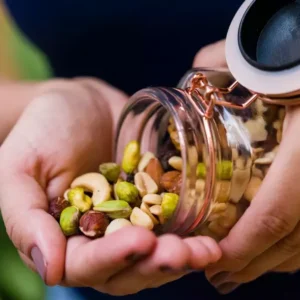Verified on 12/21/2023 by PasseportSanté
Vitamin K is the blood clotting vitamin par excellence. In addition to its anti-hemorrhagic role, it also helps preserve the health of bone tissue. There are several forms of vitamin K, one synthesized by plants and the other by bacteria in the intestinal flora of humans and animals. Although very rare in adults, vitamin K deficiency is common in newborns.
Characteristics of vitamin K:
- there are three forms of vitamin K: K1, K2 and K3;
- vitamin K1 is of plant origin, K2 is of animal origin and K3 is synthetic;
- it allows blood coagulation and the maintenance of bone tissue;
- supplementation is strongly recommended in newborns to avoid hemorrhagic disease;
- in the event of anti-vitamin K treatment, food intake can be controlled.
Food sources of vitamin K
There are two dietary forms of vitamin K:
- to vitamins K1;
- vitamin K2.
Vitamin K1 is mainly found in foods of plant origin and K2 in foods of animal origin.
|
Food |
Portions |
(µg) |
|
Cabbage or kale, cooked |
1/2 tax |
442-561 µg |
|
Boiled spinach |
1/2 tax |
469-543 µg |
|
Turnip, dandelion and beet greens, boiled |
1/2 tax |
280-368 µg |
|
Cooked Swiss chard |
1/2 tax |
303 µg |
|
cooked broccoli |
1/2 tax |
169 µg |
|
Mesclun lettuce |
1 tax |
154 µg |
|
Raw spinach |
1 tax |
153 µg |
|
Raw escarole |
1 tax |
122 µg |
|
Cooked Brussels sprouts |
4 choux (80 g) |
118 µg |
|
cooked broccoli |
1/2 tax |
86-116 µg |
|
leaf lettuce |
1 tax |
103 µg |
|
Red lettuce |
1 tax |
82 µg |
|
Asparagus, raw or cooked |
1/2 tax |
48-76 µg |
|
Fresh parsley |
15 ml (1 tbsp) |
62 µg |
|
Boston and romaine lettuce |
1 tax |
60-61 µg |
|
Cabbage, raw or cooked |
1/2 tax |
39-55 µg |
|
Kiwi |
1 large (90g) |
37 µg |
|
Okra, boiled |
1/2 tax |
34 µg |
|
Chinese cabbage, raw or boiled |
1/2 tax |
30-31 µg |
|
Raw green beans |
1/2 tax |
29 µg |
Why consume foods rich in vitamin K?
Benefits for blood clotting
Vitamin K allows the synthesis of prothrombin and other proteins responsible for the activation of several clotting factors. It is the coagulation vitamin par excellence. It limits the risk of hemorrhage.
Good for bone health
Vitamin K ensures the health and strength of bone mineral mass. It supports the action of osteocalcin, an important protein for the calcification of bone tissue. At all stages of life, a good intake of vitamin K is essential to promote the growth and then renewal of bone tissue. It also helps prevent disorders linked to bone demineralization such as osteoporosis.
 Receive every day
Receive every day
advice from our experts
to take care of you

Vitamin K: needs, dosage and user guide
|
Adequate intake (AS) |
|
|
Babies 0-6 months |
5 µg |
|
Babies 7-12 months |
10 µg |
|
Babies 1-3 years old |
29 µg |
|
Children 4-6 years old |
42 µg |
|
Children 7-10 years old |
45 µg |
|
Adolescents 11-14 ans |
45 µg |
|
Adolescents 15-17 ans |
45 µg |
|
Adults 18 years and older |
79 µg |
|
Pregnant women |
79 µg |
|
Breastfeeding women |
79 µg |
Food supplements
Food supplements containing vitamin K are particularly recommended to prevent osteoporosis and cardiovascular diseases linked to calcification of the vessels. The competent authorities recommend not exceeding the dosage of 25 micrograms per day to avoid the risk of overdose, the long-term consequences of which are still unknown.
Vitamin K in babies
Vitamin K supplementation in babies is very common, even systematic. It helps compensate for the lack of intake via breast milk and the newborn’s non-existent reserves. Thus, this supplementation limits the risk of hemorrhagic disease in the first months of life.
Are there any dangers?
There are no scientific studies proving the harmful effects of excess vitamin K. As a precaution, it is however recommended to seek the advice of a doctor before considering medication supplementation with this vitamin.
Vitamin K deficiency
Vitamin K deficiency in adults is extremely rare; newborns are most at risk. A deficiency can lead to bleeding disease in the baby as well as abnormalities in bone growth. In adults, the main medium-term risk is hemorrhagic. In the long term, it is possible to observe demineralization of the bone and the occurrence of disorders such as osteomalacia or osteoporosis.
Vitamin K and anticoagulant treatments
Vitamin K interacts with anticoagulant treatments (anti-vitamin K).
Also, we notice a decrease in vitamin K levels in the event of prolonged antibiotic treatment. Indeed, a small part of vitamin K is synthesized by bacteria present in the intestinal flora. However, antibiotics weaken these bacteria and can therefore induce a significant reduction in vitamin K production.
In the event of anti-vitamin K treatment, it is therefore advisable to limit dietary intake of this vitamin. On the contrary, in the event of prolonged antibiotic therapy it may be interesting to consider supplementation.
Chemical properties
There is not one vitamin K but several K vitamins forming a group of fat-soluble vitamins. They are essential for blood clotting and mineralization of bone tissue.
There are 3 vitamins K, all belonging to the quinone family:
- Vitamin K1 (phylloquinone) is only synthesized by plants. It is therefore found in foods of plant origin (cabbage, green leafy vegetables, etc.);
- Vitamin K2 (menaquinone) is synthesized by bacteria in the intestine of mammals. It is found in foods of animal origin;
- Vitamin K3 (menadione) is a synthetic form. Today, it is no longer used in human food. Indeed, being three times more active than other forms of vitamin K, it can cause significant side effects (nausea, headaches, anemia, etc.).
Nutrient History
It was at the beginning of the 1920s that the Danish biochemist C. Dam made the fortuitous discovery of vitamin K. At the time and while he was carrying out studies on the cholesterol, he noticed that chickens deprived of lipids suffered from hemorrhages. This is how he discovered the presence of vitamin K (for Koagulation in German), a molecule responsible for blood coagulation.
Fifteen years later, he managed to purify vitamin K from alfalfa and then synthesize it chemically with the help of E. Doisy. In 1943, a Nobel Prize in medicine was awarded to C. Dam and E. Doisy for their discoveries about vitamin K.
Our dietitian’s opinion
Vitamin K is involved in blood clotting mechanisms and is also essential for bone health. In principle, daily needs are largely covered by a varied and balanced diet. It is present in good quantities in many foods such as cabbage, spinach, soy, lettuce, carrot, blueberry, etc. In other words, to cover vitamin K needs, you just need to put as many colors as possible on your plates!

Dietitian Nutritionist
June 2018

Dietitian Nutritionist
December 5, 2023, at 12:18 p.m.
94% Readers found this article helpful And you ?
Was this article useful to you?












